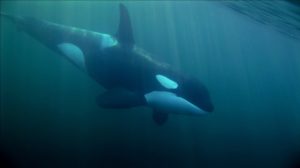I recently went to the Royal BC Museum to watch Saving Luna at the IMAX and to see the museum’s Orcas: Our Shared Future exhibit. If you haven’t heard about Luna, just go watch the IMAX movie and let yourself be carried away in laughs and appreciation for the wonderful creatures known as orcas that we share our planet with.
Saving Luna tells the story of Luna the orca, a calf that got separated from its pod and was stranded in one of Vancouver Island’s fjords. But instead of leaving and looking for his family, Luna actually befriended humans. The movie shows something you wouldn’t expect, and after watching it, you absolutely will hope that one day you’ll meet an orca and touch their nose like Luna allowed so many humans to do.
The story contrasts Luna’s friendliness to the harsh reality of human bureaucracy and how little we really know about what surrounds us.

The documentary also highlights the strong bond between Indigenous peoples and orcas. One of the elders in the movie explains that in their beliefs, orcas are the wolves of the sea and that their ancestors are connected to orcas. When a canoe full of singing and drumming Indigenous people sails into the sound to save a whale and the whale actually follows them, you know that something very special has just happened.
To me, the documentary raised quite a few questions around that topic. And maybe that’s exactly the hope of the creators. Because sometimes magical things can happen, if we are open to see things from a different perspective.
Right after the movie I went to see the Orcas: Our Shared Future exhibit at the Royal BC Museum, which is on display until March 31. When you enter the exhibit, everything is dimmed into soft light and you feel a little like you’re entering an underwater scene. The welcome is said by a video from the Lekwungen First Nation, where they explain why the orca is important to them.
Big wall screens draw you into the underwater world; the only thing missing is a big orca swimming right beside you, so you can actually feel how small you are. But not to worry, right around the corner there’s a life-size display of local orcas.
The whole exhibit is very entertaining and has interactive pieces that are enjoyable for adults or kids alike.
The exhibit features a short movie called The Mountain of SGaana by Christopher Auchter and Annie Reid—it’s a beautiful, artsy, animated story about the relationship between orcas and humans. I was the only adult-child giggling at it this afternoon, but hey, maybe you can be next.
The exhibit also clearly showcases how cruel marine parks are, and that orcas belong in nature, not in captivity. I found this to be a very valuable lesson, especially to children. You’ll also find some education about the pollution of our world seas, which is an extremely important topic and I am glad that the museum brought it to life.
So if you’re looking to do something entertaining and educating this winter season while it’s rainy outside, hop by the Royal BC Museum and experience all this yourself.
